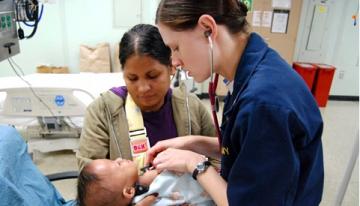The Master of Arts in Bioethics is a complementary degree program, rather than a terminal or professional degree, such as an MPH or MBA program. Therefore, our program has been crafted to work best for students who already have a graduate or professional degree, plan to pursue a professional degree program concurrently with our MA program (e.g., Nursing, Social Work, or Law) or otherwise have an established career in a health-related field.
For more information about concurrent degree programs, see Graduate School Policy. Unfortunately, it is not an option for UW medical students to concurrently enroll in our degree program due to conflicting course schedules. UW medical students may enroll in our MA before or after completing their MD.
If you would like to take our courses before you apply, you may take up to 12 credits of BH courses prior to acceptance into our graduate program. You may take these courses if you are already enrolled in a UW Graduate program or if you are a Graduate Non-Matriculated (GNM) student (see more details below),
Application Requirements
- Complete the Application for Graduate Study at the University of Washington (select Bioethics and Humanities Program) between December 1 and January 15
- Submit transcripts for degrees earned, see: Official Transcripts Requirements
- Submit a personal statement. Because our program does not offer a terminal or professional degree, we encourage applicants to pay careful attention to crafting their personal statement. While your personal statement will be unique to you, please make sure it addresses the following questions:
- What personal, professional, or educational experiences have shaped your current interests and goals?
- How will a UW MA in Bioethics help you to further your interests and/or achieve your goals?
- Our program is a complementary graduate program. How will our program augment the training or experience you already possess or will concurrently receive? If you do not already have a graduate degree, plan to concurrently enroll in another degree program, or have extensive professional work experience in a health-related field, please explain why you believe the UW MA in Bioethics is the best course of action at this time.
- Submit an essay in response to the essay prompt (do not submit a writing sample instead)
- Ensure three letters of recommendation are submitted by January 15
- If you selected “no” to the question Are you a native English speaker? in your graduate school application, you will be asked to demonstrate English Language Proficiency
- Before applying, we encourage prospective students to meet with our Graduate Program Advisor. Please contact bhadvise@uw.edu.
Admissions Timeline
- Mid-February: Admissions decisions are conveyed through the SLATE and are final
- Mid-April: If you have been admitted, you must accept, decline, or defer the offer and your admission decision is final
- Late-September: If you have been admitted and accepted, plan to attend orientation and begin your autumn coursework
 Our flexible two-year, in-residence program provides students with the foundational knowledge, skills, and experience to enrich their careers and broaden their competency in bioethics. The program offers training in research and clinical aspects of bioethics as well as empirical and normative methods of analysis. Students have the opportunity to study with diverse and well-respected faculty from the University of Washington, the Treuman Katz Pediatric Bioethics Center, and the Seattle Veteran’s Health Administration. Our program helps prepare students to teach, publish, and conduct research that incorporates bioethical analysis.
Our flexible two-year, in-residence program provides students with the foundational knowledge, skills, and experience to enrich their careers and broaden their competency in bioethics. The program offers training in research and clinical aspects of bioethics as well as empirical and normative methods of analysis. Students have the opportunity to study with diverse and well-respected faculty from the University of Washington, the Treuman Katz Pediatric Bioethics Center, and the Seattle Veteran’s Health Administration. Our program helps prepare students to teach, publish, and conduct research that incorporates bioethical analysis. The Wylie Burke Endowed Scholarship for Diversity supports UW undergraduate and/or graduate students from diverse social and experiential backgrounds, who are working in interdisciplinary space to study the social, ethical, and policy implications of health research and/or healthcare. The $1,000 scholarship seeks to cover costs of tuition, books, fees, travel to professional meetings, and other educational expenses.
The Wylie Burke Endowed Scholarship for Diversity supports UW undergraduate and/or graduate students from diverse social and experiential backgrounds, who are working in interdisciplinary space to study the social, ethical, and policy implications of health research and/or healthcare. The $1,000 scholarship seeks to cover costs of tuition, books, fees, travel to professional meetings, and other educational expenses. 













